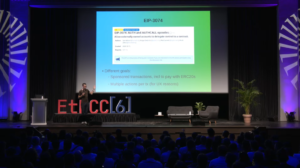
Ethereum’s Account Abstraction Challenges
While account abstraction is perceived as a catalyst that could attract a billion users to Ethereum, Vitalik Buterin, the blockchain’s co-founder, outlined some challenges in implementing the new feature.
On the 18th of July, at the Ethereum Community Conference (EthCC) in Paris, Buterin discussed some of the most significant innovations that modern account abstraction offers as well as the obstacles that the community is currently confronting with the concept.

Vitalik Buterin at the EthCC event held in Paris. Source: EthCC
Currently, to pay network transaction fees when transferring ERC-20 tokens, Ethereum users must possess Ether.
According to Buterin, account abstraction extensions, commonly referred to as “paymasters,” permit users to pay their fees with “whatever coins they are transferring.” He explained:
“This is actually especially a big deal on rollups because in a rollup a big or on because a big part of the size of a transaction is the signature on a rollup.”
In addition, the extension can enable decentralized applications (DApps) to sponsor user transactions. In addition, Buterin discussed another extension called signature aggregation.
The founder of Ethereum claims that developers can save money on electricity and data by using this feature to compile signatures.
In addition to the prospective benefits of account abstraction for users, he acknowledged that developers must still overcome obstacles.
This necessitates an Ethereum Improvement Proposal (EIP) to convert existing Ethereum externally-owned accounts (regular user accounts) into smart contracts, as well as ensuring that the protocol functions identically in layer-2 solutions.
Buterin also noted that integrating with existing technologies, including biometrics and existing wallets, presents additional challenges.
Despite the difficulties encountered by the account abstraction project, the co-founder of Ethereum expressed enthusiasm for its advancement.
“Account abstraction has made a lot of progress, and I’m excited about all of the progress that we’ll continue making in the future,” he said.





